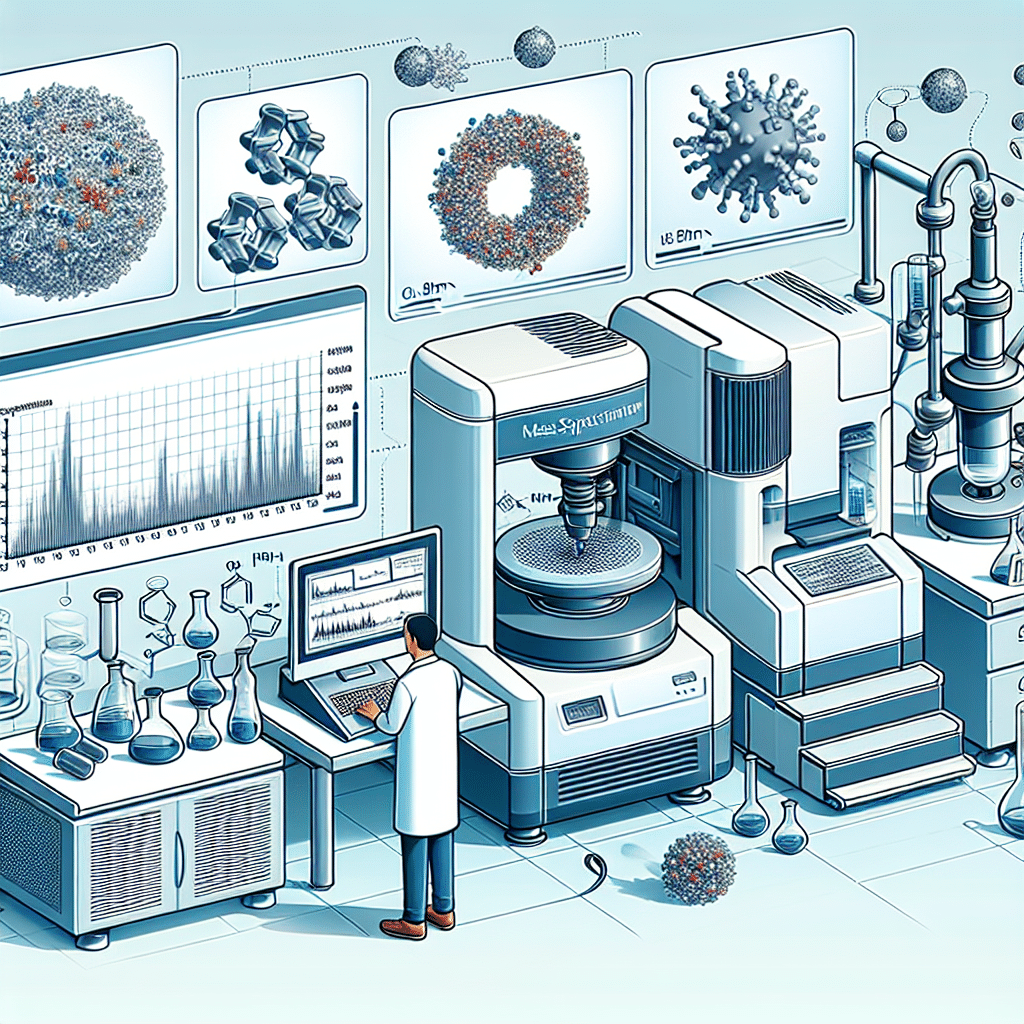Mass Spectrometry in Proteomics: Identifying Proteins Precisely
-
Table of Contents
- Mass Spectrometry in Proteomics: Precision in Protein Identification
- The Role of Mass Spectrometry in Proteomics
- Principles of Mass Spectrometry
- Types of Mass Spectrometers
- Applications of Mass Spectrometry in Proteomics
- Protein Identification and Characterization
- Quantitative Proteomics
- Protein-Protein Interactions
- Clinical Diagnostics and Biomarker Discovery
- Challenges and Future Directions
- Case Studies and Statistics
- Conclusion
- Discover High-Quality Proteins with ETprotein
Mass Spectrometry in Proteomics: Precision in Protein Identification

Proteomics, the large-scale study of proteins, is a critical field in biological sciences, providing insights into the structure, function, and interactions of proteins within an organism. Mass spectrometry has emerged as a cornerstone technology in proteomics, enabling scientists to identify and quantify proteins with unprecedented precision. This article delves into the role of mass spectrometry in proteomics, exploring how it revolutionizes our understanding of proteins.
The Role of Mass Spectrometry in Proteomics
Mass spectrometry (MS) is an analytical technique that measures the mass-to-charge ratio of charged particles. It is used to identify the composition of a sample by generating a spectrum of the masses of its components. In proteomics, MS is employed to identify and quantify proteins in complex biological samples, offering a high-throughput approach to study proteomes in detail.
Principles of Mass Spectrometry
Mass spectrometry operates on the principle of ionizing chemical compounds to generate charged molecules or molecule fragments and measuring their mass-to-charge ratios. The process involves several steps:
- Sample preparation: Proteins are extracted from biological samples and often digested into peptides for easier analysis.
- Ionization: The peptides are ionized, typically by methods such as Electrospray Ionization (ESI) or Matrix-Assisted Laser Desorption/Ionization (MALDI).
- Mass analysis: The ionized peptides are separated based on their mass-to-charge ratio using an analyzer.
- Detection: The separated ions are detected, and a mass spectrum is generated.
- Data analysis: The mass spectra are analyzed using bioinformatics tools to identify and quantify the proteins present in the sample.
Types of Mass Spectrometers
There are various types of mass spectrometers, each with unique features suitable for different proteomic applications:
- Time-of-Flight (TOF): Measures the time ions take to reach the detector.
- Orbitrap: Uses an electrostatic field to trap ions and measure their oscillation frequencies.
- Quadrupole: Uses a combination of electric and magnetic fields to filter ions by their mass-to-charge ratio.
- Fourier Transform Ion Cyclotron Resonance (FT-ICR): Measures the cyclotron frequency of ions in a magnetic field.
Applications of Mass Spectrometry in Proteomics
Mass spectrometry has a wide range of applications in proteomics, from basic research to clinical diagnostics:
Protein Identification and Characterization
MS is used to identify proteins in a sample and provide information about their post-translational modifications, which can affect protein function and activity.
Quantitative Proteomics
Quantitative MS techniques, such as SILAC (Stable Isotope Labeling by Amino acids in Cell culture) and TMT (Tandem Mass Tags), allow for the comparison of protein levels across different samples, providing insights into the dynamics of protein expression.
Protein-Protein Interactions
By identifying the proteins that co-purify with a protein of interest, MS can help map protein-protein interaction networks, shedding light on the functional organization of the proteome.
Clinical Diagnostics and Biomarker Discovery
MS-based proteomics is increasingly used to discover biomarkers for diseases, enabling early diagnosis and personalized medicine.
Challenges and Future Directions
Despite its power, mass spectrometry in proteomics faces several challenges:
- Complexity of samples: Biological samples can contain thousands of proteins, making their analysis challenging.
- Dynamic range: The abundance of proteins in a sample can vary greatly, requiring methods to detect both high- and low-abundance proteins.
- Data analysis: The vast amount of data generated by MS requires sophisticated bioinformatics tools for analysis.
Future advancements in MS technology and data analysis are expected to overcome these challenges, further enhancing our ability to study the proteome.
Case Studies and Statistics
Several case studies highlight the impact of mass spectrometry in proteomics:
- A study on cancer proteomics identified potential biomarkers for ovarian cancer using MS, leading to improved diagnostic strategies.
- MS-based proteomic analysis has been used to understand the molecular mechanisms of Alzheimer’s disease, providing potential targets for therapy.
Statistics show the growing importance of MS in proteomics:
- The global proteomics market is expected to reach $38.7 billion by 2024, with MS-based techniques being a significant contributor.
- Publications on MS in proteomics have been growing at an annual rate of over 10%, reflecting the expanding research in this field.
Conclusion
Mass spectrometry has become an indispensable tool in proteomics, offering precise identification and quantification of proteins. Its applications range from basic research to clinical diagnostics, and ongoing advancements promise to address current challenges and expand its capabilities. As proteomics continues to evolve, mass spectrometry will undoubtedly play a pivotal role in shaping our understanding of the proteome and its implications for health and disease.
Discover High-Quality Proteins with ETprotein
If you’re looking for premium protein products for your research or industry needs, consider ETprotein. Their extensive range of organic bulk vegan protein and plant proteins, including organic rice protein, clear rice protein, pea protein, and more, are non-GMO and allergen-free, making them suitable for a variety of applications. ETprotein’s commitment to quality and customer service makes them a top choice for protein supplies.
About ETprotein:
ETprotein, a reputable protein Chinese factory manufacturer and supplier, is renowned for producing, stocking, exporting, and delivering the highest quality organic bulk vegan protein and plant proteins. They include Organic rice protein, clear rice protein, pea protein, clear pea protein, pumpkin seed protein, sunflower seed protein, mung bean protein, peanut protein etc. Their offerings, characterized by a neutral taste, non-GMO, allergen-free attributes, cater to a diverse range of industries. They serve nutraceutical, pharmaceutical, cosmeceutical, veterinary, as well as food and beverage finished product distributors, traders, and manufacturers across Europe, USA, Canada, Australia, Thailand, Japan, Korea, Brazil, and Chile, among others.
ETprotein specialization includes exporting and delivering tailor-made protein powder and finished nutritional supplements. Their extensive product range covers sectors like Food and Beverage, Sports Nutrition, Weight Management, Dietary Supplements, Health and Wellness Products, and Infant Formula, ensuring comprehensive solutions to meet all your protein needs.
As a trusted company by leading global food and beverage brands and Fortune 500 companies, ETprotein reinforces China’s reputation in the global arena. For more information or to sample their products, please contact them and email sales(at)ETprotein.com today.














